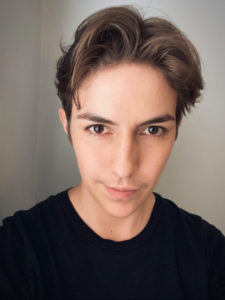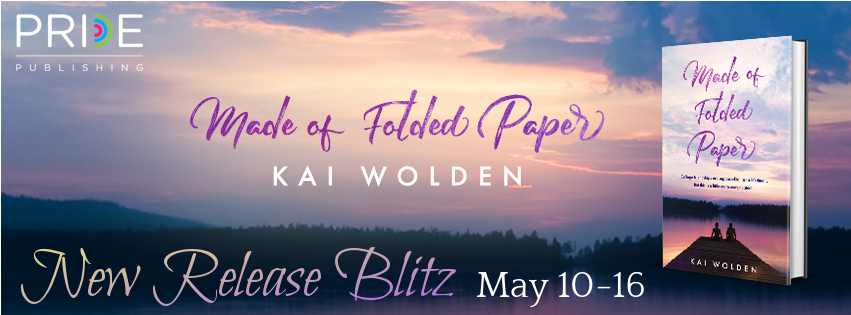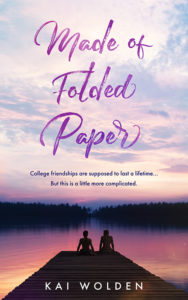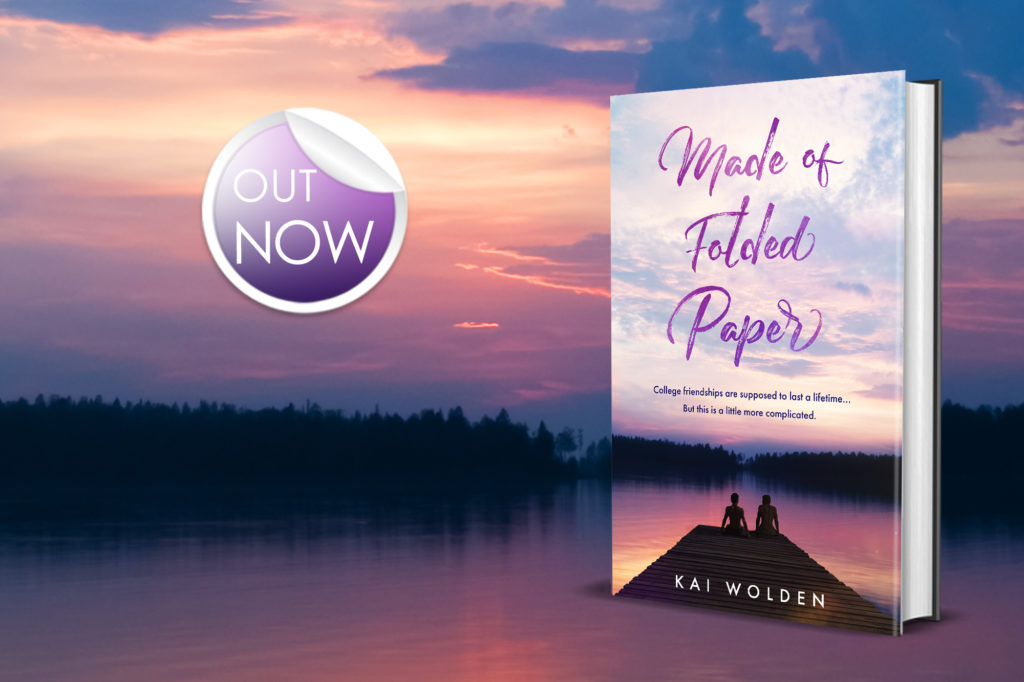Made of Folded Paper by Kai Wolden
General Release Date: 10th May 2022
Word Count: 35,645
Book Length: SHORT NOVEL
Pages: 131
Genres:
BISEXUAL,CONTEMPORARY,GAY,GLBTQI,ROMANCE,TRANSGENDER
Add to Goodreads
Book Description
College friendships are supposed to last a lifetime… But this is a little more complicated…
Will, a daydreamer and romantic from small-town Iowa, starts his first year at Weston Academy of the Arts, where his peers nickname him “Iowa.” Iowa becomes acquainted with a charismatic thespian named LA, who introduces him to his two best friends—Cynic, a suave and sardonic musician, and Charlie, a reserved and enigmatic writer.
Over time, Iowa becomes increasingly fascinated with his three new friends in different ways, forming a brotherly bond with LA and a more complex connection with Cynic. Only Charlie remains distant, capturing Iowa’s intrigue most of all.
When Iowa catches a glimpse of an alarming scar on Charlie’s chest, he becomes obsessively concerned about him. He begins to view Charlie as a fragile, tragic figure—but when he finally breaks through Charlie’s barriers, he discovers that this couldn’t be further from the truth.
As Iowa is overcome by intensifying feelings for Charlie, the group dynamic grows tense. It turns out Charlie and Cynic have a history, and seeing Charlie and Iowa together just might be enough to drive Cynic off the rails…
As graduation approaches, the four friends’ relationships are tested by jealousy, heartbreak and tragedy. Will love be enough to hold them together in the end?
Reader advisory: This book includes the death of a character in a drunk-driving incident. There are mentions of substance abuse, self-harm and depression, as well as mentions of suicide, homophobia, and transphobia.
I didn’t take Cynic up on his invitation for a while because he’d been so drunk, I doubted he’d meant it or even remembered it. The Blackbird Café was the more upscale alternative to the cafeteria, and I had always avoided it due to the price. But one rainy afternoon as I was passing by, I glanced through the expansive front window and saw the three of them camped out in a booth, laptops, books and mugs scattered across the tabletop. The image was so picturesque and comforting, I couldn’t help but stop and stare for a minute. Then LA caught sight of me and waved, and I had no choice but to go inside. The atmosphere was vastly different from the hectic cafeteria, cozy and tranquil with the hum of murmured conversation, the tapping of fingers on keyboards, and the gentle clink of dishware.
LA looked up as I approached and exclaimed, too loudly for the hushed environment, “Iowa, thank God you’re here. I have an audition tomorrow morning, and these two think they’re too cool to run lines with me.” He scooted over to make room for me, almost knocking over his mug in the process, and I slid into the booth beside him.
Cynic, who was wearing sunglasses even though the day was gloomy and slumped in his seat, head resting on the back of the bench, said lazily, “Charlie thinks he’s too cool to run lines with you. I’m just too fucking hungover.”
Charlie, who sat across from me, nose buried in a book I’d never heard of, responded, “I just don’t see why you need us to do it when you have dozens of overeager theater friends.”
“Come on, you know how theater kids are,” LA complained. “They always try to make everything about themselves!”
Cynic winced at his volume and brought a hand to his forehead. Charlie lowered his book to give LA a deadpan look. “I can’t imagine what that’s like.”
“You’ll read with me, won’t you, Iowa?” LA coaxed, sliding a script in front of me. “It’ll be just like Shakespeare class.”
“LA, I’m really not good at this,” I sighed. Somehow the prospect of reading in front of Cynic and Charlie seemed ten times more daunting than doing it in front of the entire Shakespeare class.
“You don’t have to be good,” LA reassured me. “I’m the one who has to be good.”
“At least let him get a drink first,” Cynic chimed in, coming to my rescue. “Put it on my tab. Last name’s Devereux. And while you’re at it, I could go for a Bloody Mary.”
“Cyn, you know they don’t have spirits here,” Charlie reminded him. “Just wine and beer.”
“I know. I came prepared this time.” He patted his breast pocket and I heard a faint slosh. “Just get me a Clamato, will you?”
I complied, grateful for the distraction. It was too early for alcohol by my standards, so I ordered a coffee on Cynic’s tab. By the time I returned to the table with the burning mug in one hand and ice-cold glass of Clamato in the other, Cynic had sucked LA into a rousing debate about the racial dynamics in Hamilton, causing him to forget about running lines with me. That was the moment I made up my mind that I liked Cynic very much.
“I’m just saying, it’s ridiculous to have a white man onstage yelling at a Black man for owning slaves.”
“But Lin-Manuel Miranda isn’t white—he’s Puerto Rican.”
“Whatever, he’s white-passing—like Charlie. It’s an important distinction. For example, Charlie can’t say the N-word, but I can.”
“You’ve never said the N-word in your life.”
“But I could if I wanted to.”
“I don’t think you could pull it off.”
“That’s racist, LA.”
I sat back and enjoyed their antics while Charlie stuck earbuds in his ears in an attempt to drown them out. Outside, rain pattered on the window and students hurried past, unrecognizable under their umbrellas and hoods. I tried to imagine what we looked like to them, recalling the idyllic image I’d seen through the glass and inserting myself the way one might picture themself in a scene from their favorite movie. Eventually, the debate died out and LA remembered his upcoming audition. Cynic, having polished off his Bloody Mary, announced that he was going for a smoke and clambered across Charlie’s lap instead of asking him to move, which Charlie tolerated without comment.
With Cynic gone and Charlie listening to music, I was much more comfortable running lines with LA. The play was a tempestuous romance written by one of the drama professors and was, I thought, rather terrible, but LA was determined to land the lead male role, Sam, which left me to play the part of Jessica. He read with such fervor that I was sure the people nearby thought we were having a real conversation and that we were involved in the most toxic relationship in campus history. Charlie had the grace to pretend he couldn’t hear us, but at one point when Sam accused Jessica of cheating and she threw a drink in his face—which I mimed with my empty mug—I caught him smiling.
LA got the part, of course—he was unquestionably the best actor at Weston—and within the first couple weeks of rehearsal, he started dating the short, freckled redhead who played his love interest. At first I wondered how healthy this could be after watching the two of them scream at each other onstage for hours on end, but I found they were refreshingly affectionate offstage without being gratuitous.
The Blackbird became my regular haunt, thanks to Cynic’s apparently limitless tab which kept me fueled with overpriced coffee, baked goods, sandwiches and, in the evenings, wine. I’d never had a rich friend before, and half the time I didn’t know whether I should believe the things that came out of his mouth. He was aware of this and used it to mess with me sometimes. Once, when I reproached him for smoking in the theater, he replied, “My father paid for this building. I can do whatever I like in it.” When I gaped at him in amazement, he cracked a grin and said, “I’m kidding, Iowa. Jesus.”
Cynic, I learned, was an only child, like me, but his parents were divorced and his father had remarried, giving him two “God-awful white step-siblings.” He was a dreadful student, was only passing his classes because of Charlie, had dropped or flunked out of three other schools previously and was actually my age. Evidently, he’d only ended up at Weston because his father had refused to keep funneling endless money into a hopeless cause. But now he was dead-set on graduating, to spite his father if nothing else. He and Charlie had been roommates their first year, while LA had lived down the hall, and the three of them had been inseparable ever since. Cynic and Charlie, I thought, had the dynamic of an old married couple, while LA was perhaps their energetic son. I might even have thought the two of them were in a relationship if I hadn’t seen Cynic slipping away with women at parties so frequently.
Cynic was entirely unashamed if not proud of his utter dependence on Charlie. He was fond of announcing, “I’d be dead if it wasn’t for Charlie. I owe this guy my life,” while ruffling Charlie’s unkempt curls. He meant it literally, I found out later, when I got the story out of LA. At a holiday party their freshman year, Cynic had given himself alcohol poisoning, passed out in a snowbank and most certainly would have died had his roommate not gone out searching for him. I must have looked concerned because LA assured me, “He was a lightweight back then.”
I asked, “Have you ever tried to talk to him about it? The drinking?”
He shrugged theatrically, turning his palms to the sky. “Have you ever tried to have a serious discussion with Cynic? It’s impossible. Besides, we all drink.”
While this was true, I thought it was obvious that Cynic’s drinking was on another level. In fact, now that I thought about it, I wasn’t sure I’d ever seen him completely sober. He held it well so he got away with it. I only saw him truly wasted at parties, and even then he managed to appear unfailingly cool and collected.
LA, in contrast to Cynic and me, came from a large, close-knit family with five siblings, three older and two younger, all of whom were pursuing much more practical career choices than him. He’d ended up at Weston because his parents were convinced he only wanted to be an actor because he’d grown up in Los Angeles and were unwilling to spend any real money on his education until he deigned to study something serious. He, like Cynic, was committed to proving his parents wrong. “I’d rather die than work a single day at a desk job,” he told me more than once. In the grand tradition of theater students, he planned to move to New York after college and try to make it on Broadway.
As LA and Cynic took shape as vibrant, full-fledged characters in my mind, Charlie remained muddled and obscure. He almost never talked about himself and was difficult to start a conversation with at all. Though he bantered freely with the other two, he was guarded when it came to me. I could almost see him withdrawing into his impenetrable shell when I approached. Occasionally, though, he offered up tidbits of information, seemingly by accident as if he’d forgotten my presence. Once, when I’d offered to take a look at Cynic’s car, a gorgeous BMW convertible that he’d neglected to change the oil on for over a year, Charlie remarked, “My dad taught my brothers everything there is to know about cars but didn’t teach me a damned thing.”
“Why?” I asked him, and he glanced at me sidelong, exhaled a stream of smoke and said nothing.
Another time, when I was saying something quaint about my small-town roots, he interrupted, “So what? I’m from a small town too and you don’t hear me blabbing about it all the time.” I clamped my mouth shut and felt myself blush.
The one safe topic I could find common ground with him on was books. Cynic and LA didn’t read much, but Charlie consumed novels at an almost alarming rate and seemed to have a new one in his possession every time I saw him. Every now and then, I got lucky and had actually read or at least heard of the book he was reading. A few times, I was even able to draw him into real conversations about them. This was somewhat nerve-racking because he lost interest so easily if I said the wrong thing, but it was also delightful because once in a while, if I said just the right thing, I was able to earn a smile.
As winter set in, LA and I started going to the campus gym for exercise. His girlfriend, Lindsay, tagged along sometimes—it was important for stage actors to keep in shape, she told me. They usually stuck to the weight room, but I’d been a swimmer in high school so I was drawn to the lap pool, which was far superior to the one in my hometown. Cynic avoided exercise at all costs, but Charlie made sporadic appearances at the gym. He once disclosed that he had run track in high school, but he was nowhere near as fast now, thanks to smoking. One day, LA and I were getting dressed in the locker room when Charlie joined us, wet from the shower, a towel draped around his slim shoulders. He faced away from me as he shimmied into his jeans, and I focused on tying my shoes. LA left abruptly to meet Lindsay, but I lingered, packing my bag.
At some point, the idea had taken root in my mind that Charlie was gay. I wasn’t exactly sure what made me think this. I had never seen him with anyone or heard him mention a romantic partner. I couldn’t justify it, but something about his appearance and mannerisms had me absolutely convinced. And it made me nervous, not because I was uncomfortable with it, but because I was afraid that I would inadvertently do or say something to make him think that I was uncomfortable with it. I suspected this might be the reason he was so reserved around me. My “Iowa” persona was largely constructed on my sheltered naïvety, and perhaps this had led him to believe that I might be homophobic. So I lingered even though I was ready to leave because I didn’t want to give him the impression that I was uneasy being alone in the locker room with him.
I didn’t look at him directly as he dried his hair with his towel, put on deodorant and pulled his T-shirt over his head. But I didn’t look away either. And it caught my eye as he half-turned in my direction, a ropey pink scar that stretched from under his arm all the way across the left side of his chest. I reacted before I could stop myself, drawing in a sharp breath and exclaiming, “Charlie!”
He looked at me, pulled down his T-shirt, then muttered, “Don’t treat me any differently.”
I could only stare at him. With a cloudy expression, he gathered up the rest of his things and left.
Over the next few days, my imagination ran wild. My first thoughts were of some sort of horrific accident—I had visions of Charlie, bloody and unconscious, slumped in the wreckage of a mangled car. After I calmed down a bit, I realized that was unlikely. The scar was far too neat for that—it was a surgical scar, which struck me as even more ominous. A heart surgery? A transplant, even? After some gruesome research, I found that these types of scars were typically vertical, not horizontal. But still, whatever it was, surely it was dire. What had he meant by “Don’t treat me any differently”? I racked my brains at night, unable to stop picturing the dark look on his face. Wouldn’t someone have told me by now if Charlie was unwell, if his life was in danger?
I tried not to treat him any differently, but every time I saw him, I had flashbacks to hospital rooms, gurney beds, IVs and beeping monitors. My father’s wheezing cough. The smell of disinfectant and death. If Charlie had been standoffish toward me before, now he was downright cold. He hid behind a book whenever I sat down in our booth at the Blackbird and came up with a reason to leave shortly after I arrived. I couldn’t tell if Cynic or LA had noticed his behavior. They were his best friends so they undoubtedly knew his secret, but I could glean nothing of it from them. They didn’t act like there was anything wrong with him—in fact, the way Cynic rough-housed with him sometimes made me clench my teeth with anxiety. Charlie had become a fragile thing in my mind, a delicate thing made of folded paper that might crumple at any moment or blow away in the wind.
My fears culminated one afternoon when I went to the Blackbird after class and found only Cynic, LA and Lindsay awaiting me. LA and Lindsay were running lines for their next play—since her arrival, I didn’t have to do it anymore—and Cynic was drinking coffee, probably spiked with something from his trusty flask, and staring out the window. I sat next to him in Charlie’s usual spot, which felt strange.
“Where’s Charlie?” I asked him, attempting to keep my tone light, though a feeling of foreboding had settled over me.
“Sick,” he replied. “I think he’ll be out for a few days.”
I had to bite my tongue to stop myself from interrogating him.
Charlie was out for more than a few days. The week that dragged by was the longest week of my life since my father’s death. I confined myself to asking about him once a day, receiving only short, uninformative replies from Cynic. He didn’t seem worried, but he did appear somewhat listless. He and Charlie did everything together and he was lost on his own. He asked me for help on his assignments a couple of times, but I didn’t know anything about musical theory. He smoked even more than usual and got kicked out of the Blackbird twice for lighting up inside.
I couldn’t focus on anything. Dread gnawed at my insides, and I was stricken by a terrible pang of loss every time I saw his empty spot at the table. It was inexplicable. I hardly knew Charlie, and we definitely weren’t friends—in fact, I was fairly certain he despised me now. But when I envisioned him lying sick in bed, impossibly small under the blankets, perhaps too weak to even get a glass of water, it made my heart feel like it was riddled with shards of shrapnel. I suspect that I never fully recovered from that week of thinking Charlie was dying. It defined our relationship from then on in subtle, fundamental ways. My perspective on him shifted so profoundly, I was never able to view him the same way again. He became something more than human for me, an icon, an ideology.
When I showed up at the Blackbird to find him reading at our table as though nothing had happened, I froze in my tracks for an instant, unable to believe my eyes for I’d thoroughly convinced myself by then that I would never see him again. No one noticed my momentary loss of composure. LA and Cynic were arguing cheerfully about something, and Charlie didn’t look up from his book. I slid into my seat, eyes fixed on his face. He looked a bit thinner, I thought, and maybe a few shades paler, but otherwise he was unchanged. I was the one who had changed.
“Are you feeling better?” I asked him, and his eyes flicked up from the page. They were hazel, flecked with mossy green.
“I’m fine,” he said stiffly, almost suspiciously. It was the first time he’d spoken to me since that day in the locker room. I kept gazing at him, at a loss for words, until he frowned and hid his face behind his book.
His ambivalence toward me did nothing to lessen my newfound feelings of protectiveness. Although we barely interacted, I kept an eye on him, making sure that he looked all right, that he was dressed warmly enough and his color was returning. His skin, though light, had a warm, tawny undertone that was more noticeable to me in the winter when mine turned stark pale. I did my best to keep my sentiments to myself, but they burst out of me unexpectedly at times. One night when Charlie, Cynic and I were walking to the theater to see LA’s latest play, Cynic stopped to flirt with a group of women, and Charlie, while waiting, lit a cigarette.
“You shouldn’t smoke,” I said without thinking, startled at the boldness of my words. He looked at me like I’d grown a second head, cigarette hanging forgotten from his lip. “You’ve been sick,” I added as a justification.
He kept staring wordlessly until Cynic wrapped up his exchange and led us onward, throwing an affectionate arm around Charlie’s neck as he often did. The cigarette fell from Charlie’s lips to land forlornly in the wet slush, and I stepped on it as I passed.
Buy Links
Choose Your Store
First For Romance
Amazon
Kai Wolden
Kai Wolden writes fantasy, sci fi, and contemporary fiction starring queer, trans, and gender-nonconforming characters. Whether it takes place in outer space, a fantasy world, or a modern-day college campus, Kai loves honest, heart-wrenching stories about queer love in all its forms: friendship, romance, found family, and those ambiguous relationships that are somewhere in-between. Growing up queer and trans in small-town Wisconsin, Kai always wished he could find fictional characters who were more like him. Now he’s populating the world with them, one book at a time!
Check out Kai’s website here.
Enter for the chance to win a $50.00 First for Romance Gift Card! Competition hosted by Totally Entwined Group.








